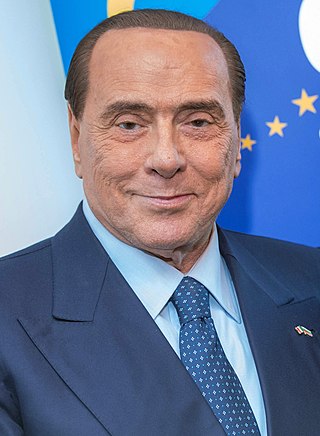
Silvio Berlusconi is an Italian media tycoon and politician who served as Prime Minister of Italy in four governments from 1994 to 1995, 2001 to 2006 and 2008 to 2011. He was a member of the Chamber of Deputies from 1994 to 2013, and has served as a member of the Senate of the Republic since 2022, and previously from March to November 2013, and as a Member of the European Parliament (MEP) since 2019, and previously from 1999 to 2001.
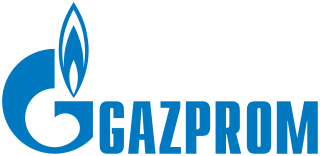
PJSC Gazprom is a Russian majority state-owned multinational energy corporation headquartered in the Lakhta Center in Saint Petersburg. As of 2019, with sales over $120 billion, it was ranked as the largest publicly listed natural gas company in the world and the largest company in Russia by revenue. In the 2020 Forbes Global 2000, Gazprom was ranked as the 32nd largest public company in the world. The Gazprom name is a contraction of the Russian words gazovaya promyshlennost. In January 2022, Gazprom displaced Sberbank from the first place in the list of the largest companies in Russia by market capitalization. At present, the company is delisted from international markets, and continues substantial construction in its operational results.
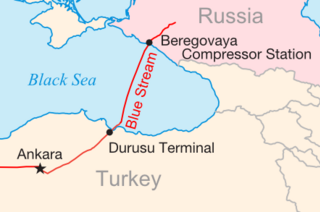
Blue Stream is a major trans-Black Sea gas pipeline that carries natural gas to Turkey from Russia. The pipeline has been constructed by the Blue Stream Pipeline B.V., the Netherlands based joint venture of Russian Gazprom and Italian Eni. The Blue Stream Pipeline B.V. is an owner of the subsea section of pipeline, including Beregovaya compressor station, while Gazprom owns and operates the Russian land section of the pipeline and the Turkish land section is owned and operated by the Turkish energy company BOTAŞ. According to Gazprom the pipeline was built with the intent of diversifying Russian gas delivery routes to Turkey and avoiding third countries.
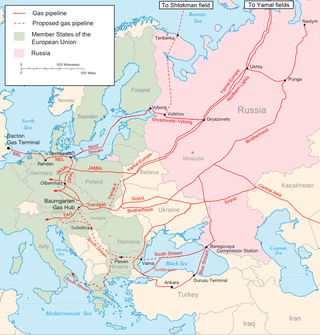
The Russia–Ukraine gas disputes refer to a number of disputes between Ukrainian oil and gas company Naftogaz Ukrayiny and Russian gas supplier Gazprom over natural gas supplies, prices, and debts. These disputes have grown beyond simple business disputes into transnational political issues—involving political leaders from several countries—that threaten natural gas supplies in numerous European countries dependent on natural gas imports from Russian suppliers, which are transported through Ukraine. Russia provides approximately a quarter of the natural gas consumed in the European Union; approximately 80% of those exports travel through pipelines across Ukrainian soil prior to arriving in the EU.

Nord Stream is a pair of offshore natural gas pipelines in Europe that run under the Baltic Sea from Russia to Germany. It comprises the Nord Stream 1 (NS1) pipeline running from Vyborg in northwestern Russia, near Finland, and the Nord Stream 2 (NS2) pipeline running from Ust-Luga in northwestern Russia near Estonia. Both pipelines run to Lubmin in the northeastern German state of Mecklenburg-Vorpommern. Each pipeline comprises two pipes, denoted A and B; each of the four pipes is approximately 1,200 kilometres (750 mi) long and with approximate diameters of 1,220 millimetres (48 in). The combined capacity of the four pipes is 110 billion cubic metres per annum of natural gas.
RosUkrEnergo is a Swiss-registered venture company that transports natural gas from Turkmenistan to East European countries. 50% of the company is owned by Gazprom, through its daughter Swiss-registered Rosgas Holding A.G., and another 50% by Swiss-registered private company Centragas Holding A.G., acting on behalf of a consortium of GDF Group owned by Dmytro Firtash and Ivan Fursin.

Naftogaz of Ukraine is the largest national oil and gas company of Ukraine. It is a state-owned company subordinated to the Government of Ukraine. The vertical-integrated company carries out a complete cycle of exploration operations and development of deposits, operating and exploratory drilling, extraction, transportation, and refinement of natural gas and crude oil, supply of natural and liquefied gas to consumers.
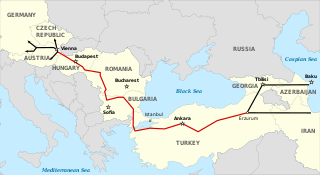
The Nabucco pipeline was a failed natural gas pipeline project from Erzurum, Turkey to Baumgarten an der March, Austria to diversify natural gas suppliers and delivery routes for Europe. The pipeline was to lessen European dependence on Russian energy. The project was backed by several European Union states and the United States and was seen as rival to the Gazprom-Eni South Stream pipeline project. The main supplier was to be Iraq with potential supplies from Azerbaijan, Turkmenistan, and Egypt.

Russia's energy policy which is set out in the government's Energy Strategy document, first approved in 2000, which sets out the government's policy to 2020. The Energy Strategy outlines several key priorities: an increase in energy efficiency, reducing the impact on the environment, sustainable development, energy development and technological development, as well as improved effectiveness and competitiveness. Greenhouse gas emissions by Russia are large because of its energy policy. Russia, one of the world's energy superpowers, is rich in natural energy resources, the world's leading net energy exporter, and a major supplier to the European Union. While Russia has also signed and ratified the Kyoto Protocol numerous scholars note that Russia uses its energy exports as a foreign policy instrument towards other countries.
Martin Schlaff is an Austrian businessman. He was occupied in trade with East Germany before the German reunification. According to investigations by the German parliament, Schlaff was an unofficial employee of the Stasi. His Stasi codename was "Landgraf" and registration number "3886-86". His net worth is estimated over €8 billion.

South Stream was a canceled pipeline project to transport natural gas of the Russian Federation through the Black Sea to Bulgaria and through Serbia, Hungary and Slovenia further to Austria. It was never finished.

The 2005–06 Russia–Ukraine gas dispute was between Ukrainian state-controlled oil and gas company Naftogaz Ukrainy and Russian national gas supplier Gazprom. The disagreements concerned natural gas supplies, prices and debts. The conflict started in March 2005, ended in January 2006 and, in addition to the gas companies, involved politicians from both countries.

In 2009, Russian natural gas company Gazprom refused to conclude a supply contract unless Ukrainian gas company Naftogaz paid its accumulating debts for previous gas supplies. The dispute began in the closing weeks of 2008 with a series of failed negotiations, and on January 1, 2009 Russia cut off gas supplies to Ukraine. On January 7 the dispute turned to crisis when all Russian gas flows through Ukraine were halted for 13 days, completely cutting off supplies to Southeastern Europe, most of which depends on Russian gas, and partially to other European countries.

SEFE Securing Energy for Europe GmbH, a company registered in Berlin, Germany, is headquarters of a diversified conglomerate, comprises 40 entities operating in more than 20 countries in Europe, Asia and North America. Under the former name Gazprom Germania GmbH it was a 100% subsidiary of the world's largest natural gas company, Gazprom, from 1990 to 2022. Since 2022, Germany's federal energy regulator – the Bundesnetzagentur – has controlled the company as a temporary trustee.
Centrex Europe Energy and Gas AG is "an international group of companies operating in the natural gas sector, focussing on the extraction and marketing of natural gas reserves". It is believed to be a Gazprom front company.
Vemex is a Gazprom-controlled natural gas trading company in the Czech Republic. In addition to the Czech Republic, the company also operates in Slovakia.

Russia supplies a significant volume of fossil fuels to other European countries. In 2021, it was the largest exporter of oil and natural gas to the European Union, (90%) and 40% of gas consumed in the EU came from Russia.
Silvio Berlusconi is an Italian media mogul and former Prime Minister of Italy who owns the largest broadcasting company in that country, Mediaset. His promises to buy off his personal assets to avoid conflicts of interest were never fulfilled, which sparked controversy throughout his terms in office. Berlusconi is a controversial figure in modern Italian politics: his tenure as Prime Minister was racked with scandalous sex affairs and poor judgement and decision-making. These events were widely covered by the media, drawing outcry from many of his Italian contemporaries and worldwide counterparts.
As part of the sanctions imposed on the Russian Federation as a result of the Russo-Ukrainian War, on 3 December 2022, the European Union (EU) agreed to cap the price of natural gas in order to reduce the volatility created by Russia's in the gas market.











